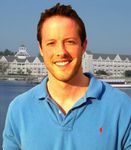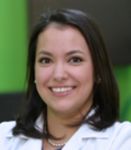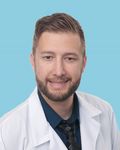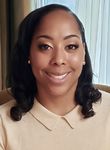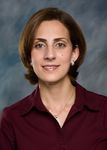Health Resources and Services Administration (HRSA) Dental Faculty Loan Repayment Program (DFLRP)
←
→
Page content transcription
If your browser does not render page correctly, please read the page content below
Health Resources and Services Administration (HRSA)
Dental Faculty Loan Repayment Program (DFLRP)
IF ANY OF THESE STORIES ARE APPLICABLE TO YOUR STATE, USE AS A TALKING POINT IN YOUR CONGRESSIONAL VISITS
Meet the Pediatric Dentistry Recipients
(as of February 2021)
Dr. Jennifer Fernandez, University of Tennessee As a minority who once benefited from government sub-
sidized health insurance programs, I was determined to
The University of Tennessee Col- be a part of the solution. With few general dentists willing
lege of Dentistry has a rich heritage of to accept Medicaid in their private offices, I have real-
alumni who became leaders in pe- ized that educational institutions and community health
diatric dentistry as well as organized centers bear much of the burden of providing care for the
dentistry. This traces back to faculty underserved. These issues compelled me to complete a
who were role models of service, com- certificate in Pediatric Dentistry at Nicklaus Children’s Hos-
mitment to the patient first and clinical pital where I met my mentor Dr. Oscar Arevalo. With his
excellence. The challenge going leadership and passion for the underserved, he inspired
forward is replacing those icons. In 2016 the average age me to pursue an academic career. After obtaining my cer-
of the faculty in the Department of Pediatric Dentistry was tificate in pediatric dentistry in 2017, I accepted a position
64 years. This is not unique to the University of Tennes- as a junior faculty at Nicklaus Children’s Hospital. While I
see. Over time residents who have been identified with was excited about my career path I wondered about my
teaching gifts and leadership skills have expressed interest ability to repay my educational loans. The HRSA Dental
in dental education if it were not for their mountain of Faculty Loan Repayment Program will enable me to focus
student debt. The HRSA Dental Faculty Loan Repayment on what’s most meaningful: develop my career as an aca-
Program enabled the identification and recruitment of demician, serve as a role model for minority children, and
such a person in Dr. Jennifer Fernandez, who tells the influence dental residents to make a difference in the lives
following story: of underprivileged children.”
“I graduated from the University of Tennessee’s pediat- Dr. Samah Omar, Loma Linda University
ric dental residency in 2016. While under the mentorship
of Drs. Martha Wells and Larry Dormois I discovered an Through the HRSA Dental Faculty
affinity for teaching, but due to the heavy burden of stu- Loan Repayment Program, Loma Linda
dent debt I was forced into private practice. I moved away University has been able to retain Dr.
after graduation to work and due to life circumstances, Samah Omar as an Associate Professor
found myself back in Memphis. The Dental Faculty Loan and full-time faculty member within
Repayment Program allowed me to both enjoy a life of the Department of Pediatric Dentistry.
teaching and comfortably repay my student loans. Were Dr. Omar earned her dental degree
it not for the faculty loan repayment half of my take home in 1999 from the Jordan University of
pay would go toward debt repayment, which would pre- Science and Technology and worked in
clude the faculty position. The freedom it has given me to private practice and community hospitals prior to moving
pursue this field of work is without measure, and for that I to the U.S. and completing the International Dentist Pro-
am truly grateful.” gram. Dr. Omar received her Certificate in Pediatric Den-
tistry in 2010 and Master of Science in Dentistry degree in
Dr. Patrick S. Lolo, Nicklaus Children’s Hospital 2011 from Loma Linda. She is certified and a diplomate of
the American Board of Pediatric Dentistry.
“Growing up in Haiti and witness-
ing oral health disparities inspired Loma Linda University School of Dentistry has had
me to pursue a career in dentistry. its pediatric dentistry department for more than two
My passion for the dental field grew decades; the class size has expanded from two to four
even stronger upon moving to Flor- residents in that time. The pediatric dentistry depart-
ida and observing similar disparities ment is very short-staffed, and recent graduates who are
among children. In 2015, after com- candidates for becoming faculty have a difficult time due
pleting my dental degree at the Uni- to their outstanding educational loans. The city of San
versity of Florida, I noticed that most Bernardino and its surroundings have some of the worst
of my classmates were not very fond of participating in the health, economic, and education indicators in the nation.
Medicaid program and helping to address the needs of Since this community is in a poverty population, more
underserved children. The most common reason was high than 50% of the children living in this area are not insured
student debt. I mean, who can fault them? Graduating or using DentiCal. Most of the local private pediatric
with $400,000 worth of student loans is a serious matter. dentistry offices do not accept DentiCal, due to low re-imbursement rates, so the Loma Linda Pediatric Dentistry that pre-doctoral programs have on the training of dental
clinic is one of the largest clinics in the Inland Empire that professionals who could greatly impact oral health care
accepts DentiCal. access and utilization, specifically amongst underserved
populations. My desire to serve the underserved was then
Thanks to the HRSA Dental Faculty Loan Repayment coupled with a desire to educate and mentor dental stu-
Program, the Pediatric Dentistry department has been dents and residents. As a result, I began pursuing a Mas-
able to recruit and also reward current faculty for their ter’s of Public Health in Health Policy and Administration.
hard work and dedication to the department. During this educational experience, I realized that a career
in full-time academia was on the horizon. As I prepared to
Dr. Scott Schwartz, Cincinnati Children’s Hospital start my first year as a full-time Clinical Assistant Professor
in the Department of Pediatric Dentistry at the University
Medical Center
of Illinois at Chicago, I began to feel the weight of my
student loan debt and wondered if a part-time academic
“After deciding to become a den-
appointment would be more economically feasible. Torn
tist as a sophomore in high school, I
between my career passion and student loan debt, I was
routinely pictured my life as a private
faced with a very difficult decision. I was then made aware
practitioner in a leafy Chicago sub-
of the HRSA Dental Faculty Loan Repayment Program.
urb. During dental school, however,
This program creates an avenue for young, eager den-
I realized the extent to which educa-
tists like myself to follow our passion and accept faculty
tional institutions are responsible for
positions without being discouraged by the substantial
shouldering the significant amount of
amount of student loan debt that we have acquired. I am
dental disease that persists among
extremely grateful to have been awarded the DFLRP grant
the poor and minority groups. As a result, my career goals
and it has further solidified my choice to pursue a career
veered away from a traditional clinical career in private
practice. Instead, I developed an interest in public health dedicated to dentistry, academia and public service.”
and academic dentistry, a curiosity I fed through my spe-
cialty training in pediatric dentistry and formalized with Dr. Ian Marion, University of Illinois at Chicago
a Master’s in Public Health. After studying health policy College of Dentistry
and management, reconciling my own feelings towards a
for-profit health care model, and gaining significant expo- “I knew entering my residency
sure to the joys of teaching, I was compelled to explore that I wanted to practice differently,
academics as a full-time career. When I finally started my but I was not entirely certain what
dream job at Cincinnati Children’s Hospital Medical Center that would entail. I sought out the
and the dust settled from 26 years in school, I fully un- opinions of my faculty and mentors
derstood the financial implications of professional school and investigated academia as my
student loans. Academic pediatric dentists make signifi- ideal future profession. My faculty
cantly less than their private practice counterparts, which and mentors lauded the positive
can make long-term dedication to this career difficult. Just aspects of the profession, and the
my monthly student loan obligation would consume more many contributions I could make to patients directly,
than half of my salary before accounting for other neces- future generations of practitioners, and the knowledge of
sities. The HRSA Dental Faculty Loan Repayment Program the profession. However, without fail, everyone I talked to
will facilitate paying down the debt burden to a point seemed obligated to mention that compensation would
where the income differential will no longer affect my always be a concern, and I should plan carefully if aca-
commitment to a career dedicated to education and pub- demia really was a career I wanted to pursue. Several of
lic service. It is a truly life changing gift to more complete- them mentioned how their academic careers were en-
ly embrace my decision to pursue a career in academic abled by loan repayment programs and how they may not
dentistry, influencing the practice of our future pediatric have chosen the career without it. I took this caution to
oral health practitioners.” heart, especially with a large private school loan burden.
Though I had a fair amount of anxiety about my financial
Dr. Brittaney Hill, University of Illinois at Chicago future, I entered a full-time academic position immedi-
College of Dentistry ately after residency, at that time without any additional
support. I loved my work, and what I was able to accom-
“Like many dental students, upon plish, but I knew I always had to have a “Plan B” ready in
completion of dental school my plan case my financial situation changed. Thankfully the HRSA
was to return to my hometown— Dental Faculty Loan Repayment Program became a reality
Memphis, Tennessee—and work as for me last year. Knowing that my loan burden has been
a full-time clinician. Little did I know alleviated grants me the security and the stability to fully
that my career would take a com- embrace my career and continue training future genera-
pletely different trajectory. While in tions of pediatric dentists.”
my pediatric dentistry residency pro-
gram, I recognized the great impactDr. Elise W. Sarvas, University of Minnesota Following dental school, Dr. Bacon pursued a
post-doctoral residency in pediatric dentistry through
“I have always been intellectually Children’s National Medical Center in Washington, DC.
curious. I earned my doctor of den- He provided dental services for medically compromised
tal surgery degree at the University children and children with special needs. He was honored
of North Carolina at Chapel Hill and with being selected as chief resident in his 2nd year. He
then pursued a master’s degree in then practiced in north Baltimore for two years before en-
pediatric dentistry at the University tering a 3-year residency in dental anesthesiology through
of Washington. But just a year into Stony Brook University Hospital in New York. There also he
my pediatric dental residency in was named chief resident, and concentrated on anesthe-
Seattle, I jumped at the chance to sia for special needs patients and children with low socio-
extend my studies by also pursuing a public health degree economic status. Dr. Bacon is now an assistant professor
that would be my springboard into academics. I found this at Howard University College of Dentistry. He works as an
path was consistent with being able to do all the things educator for pediatric and OMFS residents and plans to
I treasured most about pediatric dentistry: caring for provide anesthesia services at Howard University Hospital
medically complex patients in a hospital setting; collabo- in the near future.
rating closely with other health professionals; and finding
patterns in our oral health care system through research. During his five years of post-doctoral training, Dr.
In addition to these passions, teaching predoctoral dental Bacon accrued interest on his student loans and accept-
students and postdoctoral dental residents allows me to ed a significant loss in salary. However, the HRSA Dental
scale up clinical care for the most vulnerable patients far Faculty Loan Repayment Program has alleviated this
beyond what I could possibly do alone. I get to do what I financial burden and made it possible for him to return to
love, and help the world while doing it.” education. He hopes to utilize his foundation in anesthesia
to improve access to care for special needs patients and
“It is no secret that academic pediatric dentists make children of all ages. He seeks to improve resident learn-
far less than their private practice counterparts and I knew ing through novel educational approaches and wishes to
this as I applied for jobs across the country. When I settled inspire the future dentists of tomorrow.
in at the University of Minnesota, this abstract concept
became a harsh reality as the cost of 23 years of education Dr. Jennifer Wilson, Howard University College of
came due. Over half of my take home pay went directly Dentistry
to my student loan obligations. It is no exaggeration to
say that receiving the grant through the HRSA Dental Dr. Jennifer Wilson attended
Faculty Loan Repayment Program is life-changing. I am Howard University College of Den-
so thankful for AAPD’s efforts to advocate for these funds, tistry from 2007-2011, and graduat-
particularly the persistence of Dr. Heber Simmons who ed with a Doctorate of Dental Sur-
met personally with HRSA to explain the critical situation gery. She completed her residency in
that new faculty face. Their efforts have allowed this nerd pediatric dentistry from 2011-2013,
to pursue her dream and commitment to teaching and serving as the chief resident. In 2014,
molding the future of pediatric oral health care with a Dr. Wilson became Board Certified
much lighter financial burden.” by the American Board of Pediatric Dentistry.
Dr. Jonathan Bacon, Howard University College of “My calling in life is to work with children. As a lover of
Dentistry art and science, dentistry was a natural fit. I fused those
passions, and pursued a career in pediatric dentistry. I at-
Dr. Bacon is a Diplomate of the tended Howard University for my undergraduate, pre-doc-
American Board of Pediatric Dentist- toral, and post-doctoral education. While a student, I
ry and has always been interested became interested in giving back to my institution one
in education. His mother sparked day by teaching. This is an interest that I expressed to my
this interest at an early age. She program director; however, I knew that it would be many
taught special education for over 30 years before I was able to take on that role. With hun-
years and was extremely respected dreds of thousands of dollars in outstanding student loan
within her field. She inspired him to debt, and other expenses to consider, taking a position in
always give back to those who are academia was not a viable option. Little did I know that an
less fortunate. Accordingly, in high school he worked as an undeniable opportunity would come less than ten years
instructional assistant for special needs children. Following after graduation.”
college, he continued to pursue education and worked
as a high school teacher for Spanish and biology before Dr. Wilson worked in private practice for five years, and
eventually deciding to pursue a career in dentistry. then learned of the HRSA Dental Faculty Loan Repayment
program. With a rewarding career in academia now pos-sible, while also being able to satisfy financial obligations, tal. I take the utmost pride in teaching and scholarly ac-
Dr. Wilson accepted the HRSA grant. Dr. Wilson is now an tivities. Throughout the years I have had multiple roles as
Assistant Professor at her alma mater, Howard University. both a trainee and a trainer and have learned that nothing
She is honored to be a recipient, and looks forward to can be more fulfilling than teaching. This passion has been
cultivating an enriching future in academia. the driving force for my long journey to get to where I am
today. I have always been determined to pursue an aca-
Dr. Khrystyna Leskiv, Bronx-Lebanon Hospital demic career after residency, but the HRSA Faculty Loan
Repayment Program has been instrumental in alleviating
“Dentistry is a very special profes- the loan burden, allowing me to fully embrace my career
sion. It is demanding both academ- responsibilities to train the next generation of pediatric
ically and clinically. What drove me dentists.”
to pursue a career in academia was
a desire to help a new generation Dr. Elizabeth Palmer, Oregon Health and Science
of dentists achieve and maintain a University
healthy balance between providing
quality patient care, practicing critical-thinking skills, and “I have always known that I would
maintaining a healthy work environment. Working in like to be involved in higher educa-
academia gives me an opportunity to teach and guide tion through teaching and research.
pediatric dentistry residents in their professional growth, However, it wasn’t until I began
to direct the learning process and lead them to success. working in a dental research labora-
Moreover, doing so at BronxCare Health System, where I tory, that I realized that I also wanted
have received my own training, allows me to give back to to become a dental academician.
the institution and local community as well.” During my pediatric dentistry resi-
dency training, I had the opportunity
“I love my job and enjoy the opportunity to participate to work in a hospital setting with the state’s most vulner-
in the educational process. This opportunity would not be able pediatric populations, and I loved it. It was at that
possible without the HRSA Dental Faculty Loan Repay- point that I decided to dedicate my career to educating
ment Program, which gave me the ability to do what I love dentists so they too would be able to work successfully
without worrying about making next month’s loan pay- alongside our medical colleagues and provide care to pa-
ment. Unfortunately, working in academia means taking tients that are medically fragile, behaviorally challenged,
a pay cut – something I would not be able to do with the or socially disadvantaged. As the current pediatric den-
responsibilities of paying back my educational loans and tistry residency program director at the Oregon Health &
having a growing young family. It is an honor to receive Science University, I am in a key position to educate our
HRSA Dental Faculty Loan Repayment Program Award next generation of pediatric dentists to become clinically
and I am grateful for the ability to follow my dream and sound primary care providers that are proficient in treating
pursue a career in academia.” at risk pediatric patients.”
Dr. Ehsan Azadani, The Ohio State University “Unfortunately, a large portion of my academic salary
has gone toward paying back the education loans that I
“I completed my dental educa- accrued while in training. This has put financial stress on
tion followed by a pediatric dentistry my family. Being awarded loan repayment through the
residency in my home country of HRSA Dental Faculty Loan Repayment Program at OHSU
Iran. After my residency, I accepted a has significantly alleviated that stress. I feel very grateful
full-time faculty position and taught to be a recipient of this life changing program so that I
pediatric dentistry to pre-doc dental may be able to continue to pursue my professional goals
students and pediatric dental resi- as a pediatric dentistry educator without the worry of pay-
dents for about four years. However, ing down my debt burden.”
my passion for academic pediatric
dentistry did not stop there. I pursued further education
in the US by completing a second DDS program at the
University of Michigan-Ann Arbor and a second pediat-
ric dentistry residency at The Ohio State University and
Nationwide Children’s Hospital. Soon after my second
residency training, I entered an academic position at OSU
with a joint appointment at Nationwide Children’s Hospi-Dr. Laurita Siu, Loma Linda University Dr. Elva Jordan, University of Texas Health
Sciences Center, San Antonio
Dr. Laurita Siu graduated from
Loma Linda University School of Dr. Jordan always admired her
Dentistry in 2015, and completed her parents’ commitment to education
pediatric residency at the University and dreamed of following in their
of Nevada, Las Vegas School of Den- footsteps. Her father maintained a
tistry in 2017. Prior to dental school, private practice in prosthodontics
Dr. Siu completed a Master’s Degree and was a dental school professor
in Public Health with an emphasis in Mexico for 35 years, while her
on Epidemiology and Biostatistics at mother taught elementary special
Loma Linda University. She has worked on many research education for 20 years. After grad-
projects at the school, and plans to continue teaching uating from Texas A&M University, Dr. Jordan taught 7th
at Loma Linda University, joining the faculty in January grade science at a middle school in Laredo, Texas before
2018. Thanks to the HRSA grant, Dr. Siu can be alleviated eventually deciding to pursue a career in dentistry. Dr. Jor-
from the financial burden of loan repayment and focus on dan obtained her dental degree and postdoctoral training
empowering the future dentists with the skills needed to in pediatric dentistry at UT Health San Antonio School
become compassionate and competent professionals. of Dentistry in 2009 and 2011. She began her career in
academia immediately after graduating. She was an assis-
tant clinical professor in San Antonio for one year before
moving to Laredo, Texas in 2012. In Laredo, she worked
part-time in private practice with Dr. Joe Castellano and
taught part-time at the UT Health San Antonio Laredo Re-
gional Campus Pedo program. Dr. Jordan began teaching
full-time in 2016 and became eligible for the HRSA Dental
Faculty Loan Repayment Program. Dr. Jordan is honored
to be a recipient of the Dental Faculty Loan Repayment
Program and looks forward to cultivating an enriching
future in academia.You can also read





